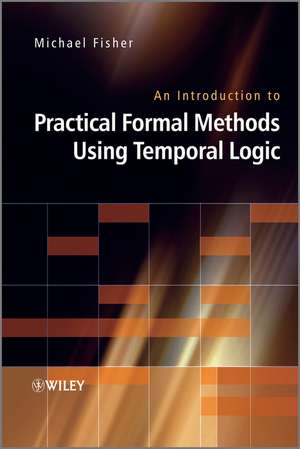An Introduction to Practical Formal Methods Using Temporal Logic
Autor M. Fisheren Limba Engleză Hardback – 17 apr 2011
- Models temporal notions and uses them to analyze computational systems
- Provides a broad approach to temporal logic across many formal methods - including specification, verification and implementation
- Introduces and explains freely available tools based on temporal logics and shows how these can be applied
- Presents exercises and pointers to further study in each chapter, as well as an accompanying website providing links to additional systems based upon temporal logic as well as additional material related to the book.
Preț: 577.17 lei
Preț vechi: 835.11 lei
-31% Nou
110.45€ • 114.66$ • 92.10£
Carte indisponibilă temporar
Specificații
ISBN-10: 0470027886
Pagini: 360
Dimensiuni: 174 x 252 x 25 mm
Greutate: 0.79 kg
Editura: Wiley
Locul publicării:Chichester, United Kingdom
Public țintă
Senior undergraduate and graduate students taking courses on formal methods in the fields of Engineering, Computer Science, Artificial Intelligence and Information Systems, practitioners and researchers working on verification, specification and development of advanced safety–critical software systems.Cuprins
Notă biografică
Michael Fisher, Department of Computer Science, University of Liverpool, Liverpool
Michael Fisher is currently Professor of Computer Science at the University of Liverpool. He also heads the Logic and Computation research group and is Director of the Liverpool Verification Laboratory. Having been an active member of the research community for over 20 years, Professor Fisher is internationally recognised for his research into logic and computer science, particularly temporal verification, automated reasoning, high-level programming languages and formal methods for multi-agent systems. This has also led him to be programme chair of the International Symposium on Temporal Representation and Reasoning in 2004, and a member of the steering committee for this event. He has co-edited several books, including Advances in Temporal Logic (Kluwer, 2000), Foundations and Applications of Multi-Agent Systems (Springer-Verlag, 2002), Temporal Representation and Reasoning (IEEE Computer Society Press, 2002) and Handbook of Temporal Reasoning in Artificial Intelligence (Elsevier, 2005).
